When we think of mental well-being, we often use it synonymously with happiness. This idea quite intrigued Carol Ryff and she came up with one brilliant model of psychological well-being which makes us think beyond just being happy.
20 years or so back, we were hardly concerned about our psychological well-being. Today, we are putting it across on the same platform as physical well-being.
Professor Carol Ryff had started experimenting with happiness and its elements to discover the true meaning of being mentally healthy even before the subject gained momentum. She became the creator of one of the most systematic, scientifically authentic and empirically stringent models of psychological well-being.
Ryff made two significant considerations while creating her model.
Firstly, her theory of psychological well-being should be scientifically valid, reliable and empirically testable.
Secondly, her model will not merely be restricted to biological or medical descriptions of well-being. Rather it will also include the philosophical intimation about the true meaning of a happy life.
She took inspiration from diverse research and theories of well-being by eminent philosophers like John Stuart Mill and Aristotle to psychologists like Carl Jung to Abraham Maslow. A thorough study of these guiding theories provided her the ground to build her new model. This makes Ryff’s model distinct from other models of psychological well-being which were created earlier.
This model is different from past models in a very important way. Ryff has created a multidimensional approach to well-being. The focus is not solely on being happy, satisfied and creating positive emotions. It includes all aspects of well-being.
According to this model, a satisfactory life is not about always being optimistic, positive and enthusiastic. The true meaning of life is not about being happy, but in living a fulfilling life.
Carol Ryff’s work is subtly rooted in the works of Aristotle. Aristotle’s Nichomachean Ethics sparked the fundamental question about human existence:
How should one live? Aristotle wasn’t trying to discern the nature of well-being. He wanted to find out a better way to live life. Aristotle was quite amused by the idea that happiness was not the end-all and be-all of a fulfilling life.
He had a genuinely concerning question in mind, “What is the highest of all goods achievable by human action?’’
He goes on to answer the question saying, “Both the general run of men and people of superior refinement say that it (the highest of all goods achievable by action) is happiness, and identify living well and faring well with being happy; but with regard to what happiness is they differ, and the many do not give the same account as the wise. For the former think, it is some plain and obvious thing, like pleasure, wealth, or honor’’ (Aristotle/Ross, 1925)
He believed that the highest human good was in ‘‘activity of the soul in accordance with virtue, and if there be more than one virtue, in accordance with the best and most complete.’’ What he understood of virtue was clearly intelligible from this excerpt he wrote about virtue.
‘‘Both fear and confidence and appetite and anger and pity and in general pleasure and pain may be felt both too much and too little, and in both cases not well; but to feel them at the right times, with reference to the right objects, towards the right people, with the right motive, and in the right way, is what is both intermediate and best, and this is characteristic of virtue.’’
What can be easily understood is one very important feature of virtue, which aims at reaching what we call is intermediate.
Aristotle was of the idea that happiness is not the destination to our journey towards good. He wasn’t concerned about the ‘subjective state of being happy’. The bigger picture he wanted to portray was that of one’s ultimate journey towards the highest good, which one could reach with self-realization.
Our main task is to discover ourselves and be aware of who we are. How one would explore oneself depends on their individual disposition, personality, and other factors. This journey is a unique one for all.
He also explicitly mentioned about putting this philosophy of life into action rather than just incubating the idea in our mind: ‘‘we must become just by doing just acts, and temperate by doing temperate acts.’’ Alongside self-awareness, he also mentions the need to get our intrinsic needs satisfied if we really want to attain the best that is within us: ‘‘one will also need external prosperity; for our nature is not self-sufficient for the purpose of contemplation, but our body also must be healthy and must have food and other attention.’’
Aristotle also reminded the readers that one should engage in noble acts for mankind and the world in general to achieve the sense of highest good.
Now you must be wondering, how are these ethics related to Carol Ryff’s work? But these indeed are related. Carol held a similar outlook towards life and inculcated in her model the need to discover, explore, understand and be aware of oneself. On the path to exploring oneself, one has to face a number of unfortunate experiences alongside some pleasurable ones. According to her, psychological well-being can be achieved only when you can attain a state of balance between both challenging and rewarding life events.
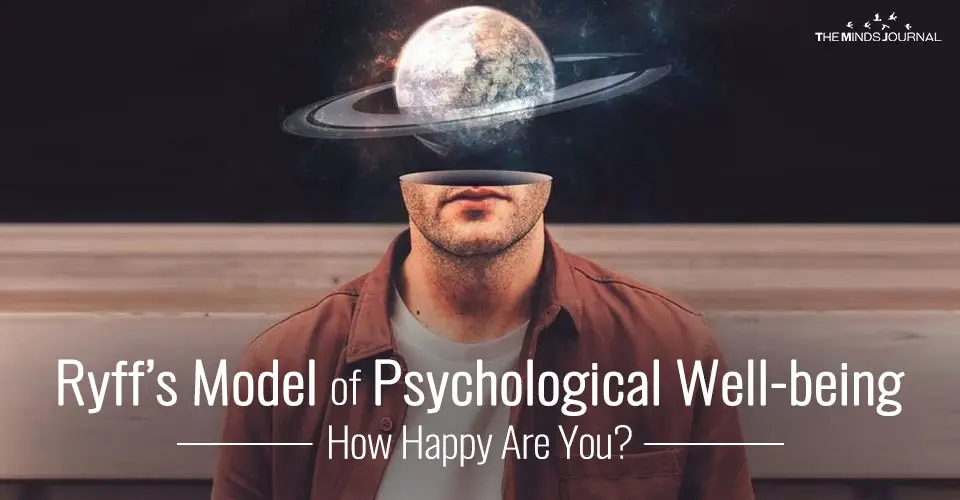
Carol introduced 6 factors in her model of psychological well-being which is: Autonomy, Environmental Mastery, Personal Growth, Positive Relations with Others, Purpose in Life and Self-Acceptance. Let’s understand each factor.
6 Factors in Ryff’s Model of Psychological Well-being
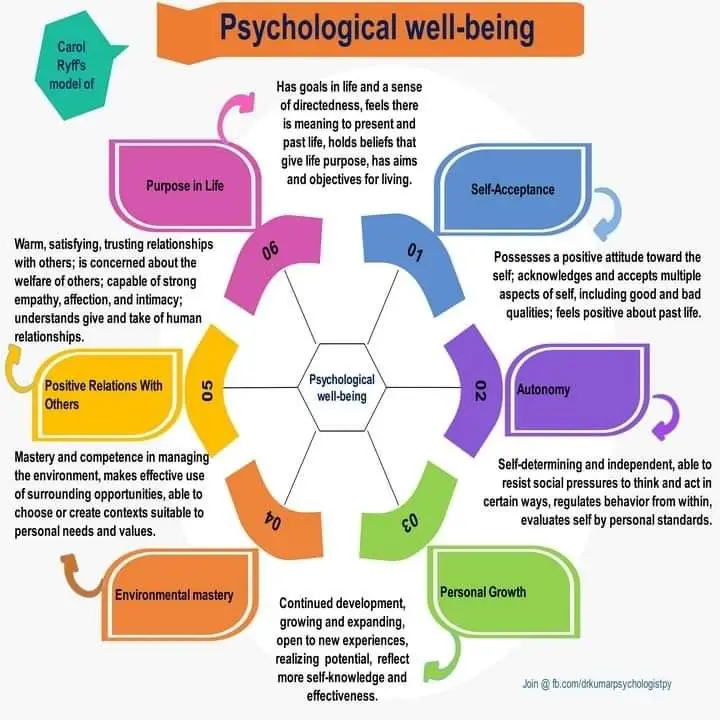
1. Autonomy
High autonomy:
High scores on this dimension indicate that you are highly independent and function independently without being influenced by societal consensus. You are self-determining and you stick to your personal opinions, choices, and ideas in the face of pressure to comply with the rules of the society. You do not let evaluate yourself by society’s standards.
Low autonomy:
Low scores on this dimension indicate that you get easily influenced by social pressures. You are dependent on others for making important decisions in our life. You are bothered by other people’s evaluation of you and their expectations. You might as well get out of your way to conform to the rules of the society to feel approved by others.
2. Environmental Mastery
High environmental mastery:
High scores on this dimension mean that you have a high competence to control your immediate environment; master complex contexts and turn to your own advantage; make effective use of opportunities and also efficiently address and manage your everyday activities; create situations to benefit your personal choices, decisions, ideas, and values.
Low environmental mastery:
If you scored low on this dimension, you have difficulty having a sense of control over your external surroundings; being unaware of opportunities; unable to create contexts to have personal benefits; failing to effortlessly manage daily activities.
3. Personal Growth
Strong personal growth:
High scores on this dimension indicate that you are continuing to develop in your life. You grab every single chance to experience noble situations and learn something from it. You are open to challenge. You are willing to explore and discover yourself that helps you expand and grow beyond your knowledge. You are slowly realizing your potentials. You are becoming increasingly aware of yourself, your needs, your value system, and your effectiveness. You find yourself improving and emerging to be a better version of yourself.
Weak personal growth:
If you scored low on this, you find your life to be stagnant, devoid of growth. You have no sense of fulfillment when you look back to the past. You seem not to have changed significantly over the years, feel bored, stuck and unsatisfied with your life; unable to embrace new attitudes, positively reinforcing behaviors and a better understanding of life.
4. Positive Relations with Others
Strong Positive Relations with Others:
High scores on this mean you have strong, positive, warm and trusting mutual relationships with others. You have the ability to connect to other people at a meaningful level with the reciprocity of intimacy, affection, empathy, and understanding. You are concerned with the welfare of others and often put a foot forward when you have to help others. You create a strong bond with others.
Weak Positive Relations with Others:
Low scorers find it difficult to create and sustain important, trusting and warm bond with other people. They feel isolated, dissatisfied and unwanted in various interpersonal relationships. They are unable to make proper connections with others or have a few close people. They fail to open up to others to create new relationships or maintain old ones.
5. Purpose in Life
Strong purpose in life:
High scores on this show that you have a sense of meaning to your life; have a sense of directedness; conceive the idea that your past life has a meaning and you should learn from it and trade forward in life; have aims and objectives in life which you want to achieve. You have a goal in mind which helps you move on with life.
Weak purpose in life:
Low scores show that you lack a sense of direction in your life. You are laid back and have few goals set in mind. You have no passionate beliefs which give meaning to your life. You go-with-the-flow of life, without any defined purpose.
6. Self-acceptance
High self-acceptance:
People who score high on this dimension have a strongly positive attitude towards oneself; feel satisfied with oneself; self-aware and accepting of one’s various aspects including both virtues and vices; is content with oneself and how one is. These people are also accepting of their past lives.
Low self-acceptance:
Low scorers are disappointed with oneself; are self-critical; are disturbed about certain personal attributes; unable to accept the person that he/she is; willing to be like others and are strongly unaccepting of one’s flaws and vices.
We all are hunting happiness; some at exotic places while the others in one’s mundaneness. The little secret is all out – It is right where you have never looked for: inside of you. Not in your money, not in your status. Look inside yourself.
Check out your psychological well-being with Ryff’s scale
The Ryff’s psychological well-being scales (PWB) is a scale consisting of 42 statements in which you have to rate how strongly you agree or disagree with the statements to find out your psychological well-being.
Instructions:
The response format consists of 6 points where point 1 indicates strongly disagree and point 6 indicates strongly agree.
This means if you rate a statement of the Ryff scale as 1, it means you strongly disagree with it and if you rate any statement as 6 it means you strongly agree with the statement. While rating from 1 to 6, your degree of agreement with the statement will increase.
Please note: Be honest with your answers.
Here you go!

Scoring key:
There are a few negative statements on this scale. Those statements’ scores need to be recorded and adjusted. This means if you have scored a 6 in one of those statements, your actual score for that statement will be adjusted to 1.
Similarly, the other scores will be adjusted in the following ways: 1 will become 6, 2 will become 5, 3 will become 4, 4 will become 3, 5 will become 2 and 6 will become 1.
Please note: The negative statements in the scale are the statements written in bold.
Add together the final degree of agreement in the 6 factors/dimensions (don’t forget to add up the adjusted scores of the negative statements) as follows:
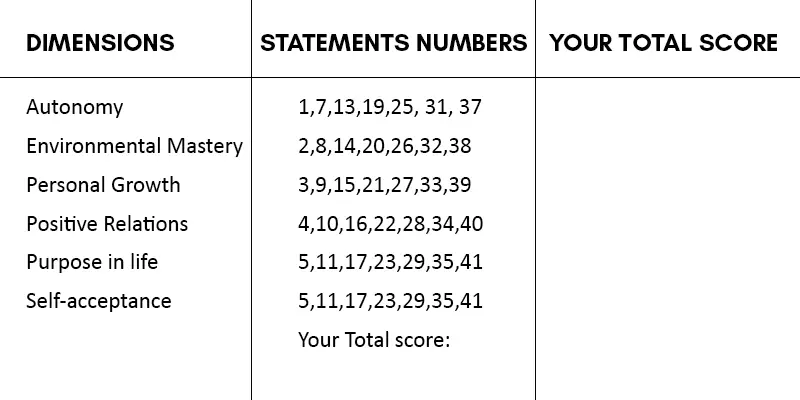
Your Total score:
Add up the total score of all the dimensions. This score is your final score. Higher your score, the higher is your psychological well-being.
References:
1. KNOW THYSELF AND BECOME WHAT YOU ARE: A EUDAIMONIC APPROACH TO PSYCHOLOGICAL WELL-BEING
You May Also Like:
30 Practices to Boost Well-Being
6 Positive Psychology Practices To Boost Happiness and Improve Your Life
How Being Nuanced with Your Emotions Enhances Your Well-Being
How Improving Relationships with Older Family Members Can Boost Your Well-Being
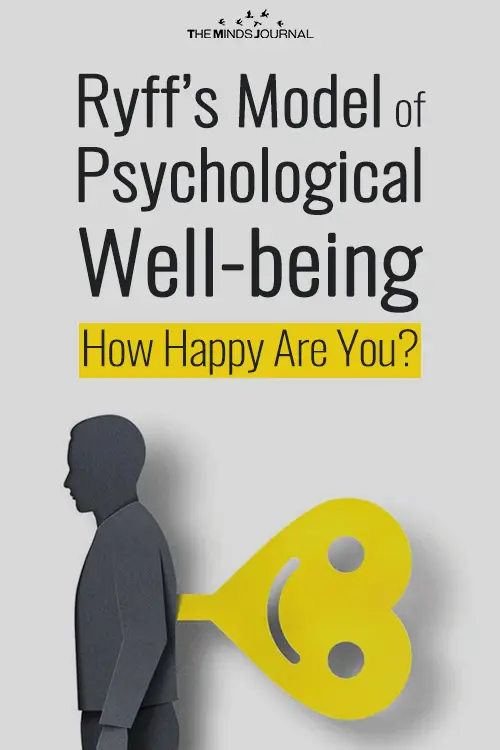
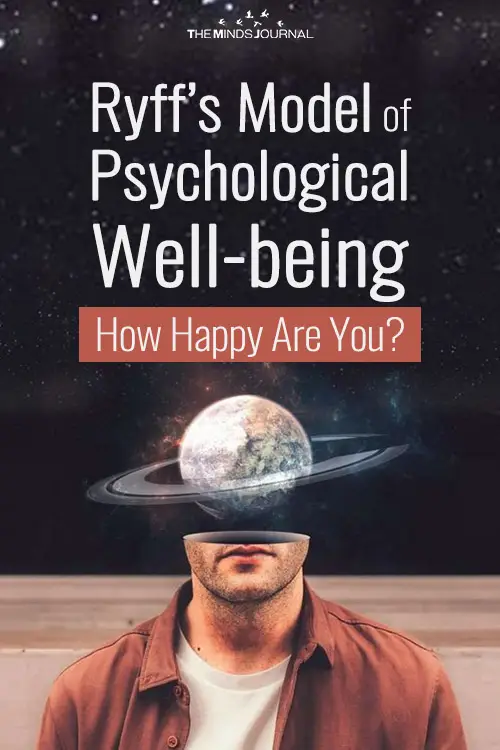
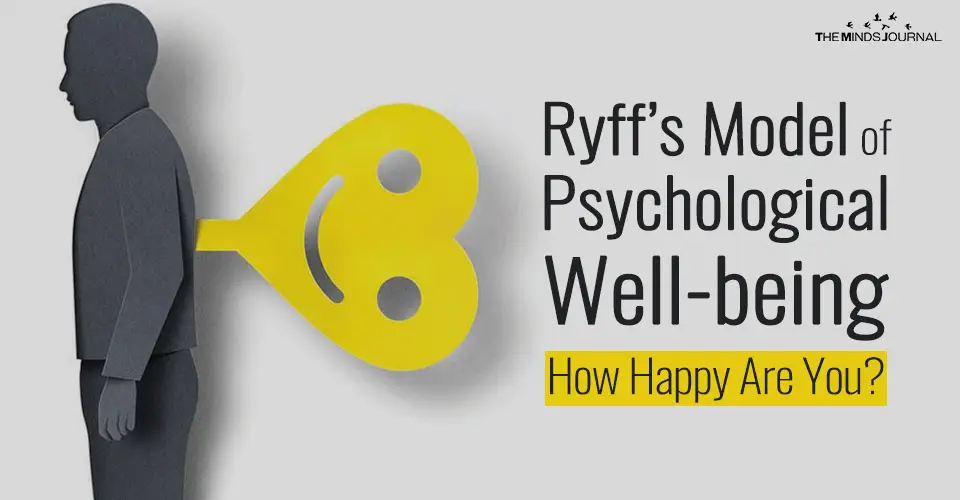

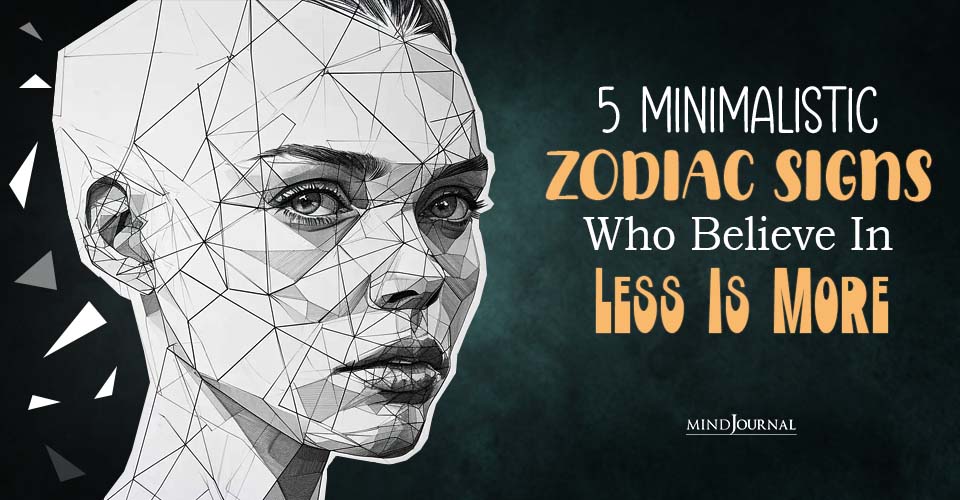




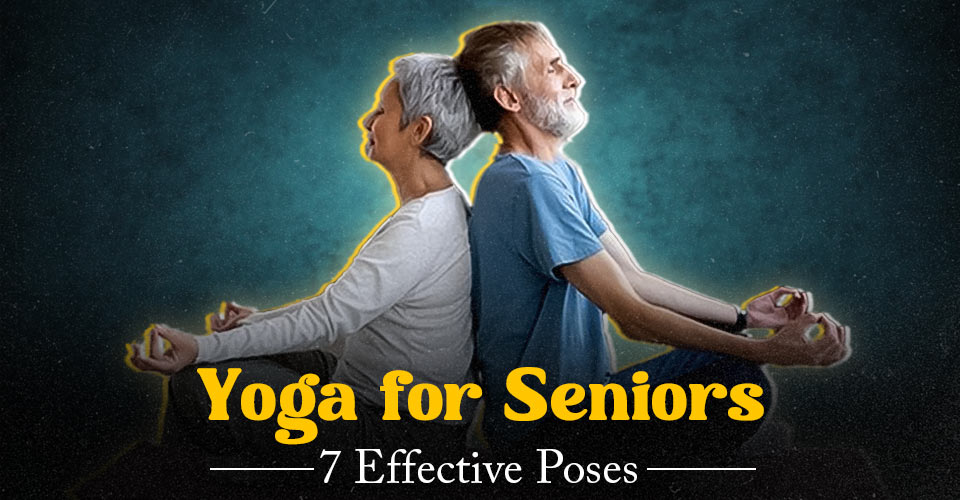
Leave a Reply
You must be logged in to post a comment.